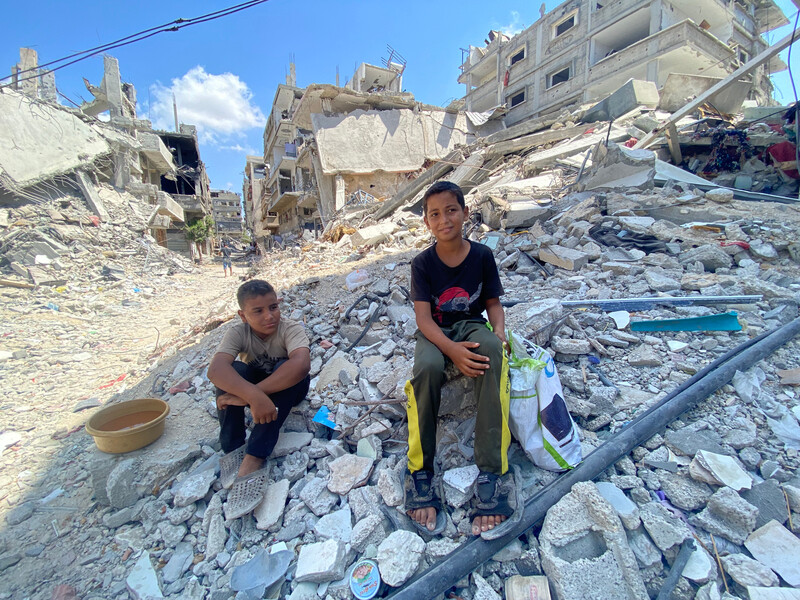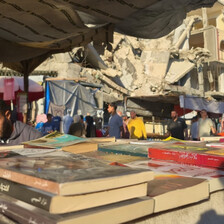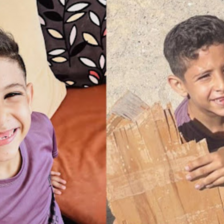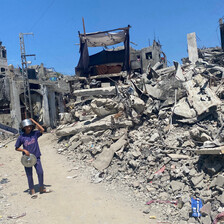The Electronic Intifada 21 October 2024

Two boys sit amid the devasation of the Jabaliya refugee camp in northern Gaza on 31 August 2024. A renewed Israeli offensive on the north in October has raised the bombardment and destruction there to a “new level” according to the UN.
APA imagesThe Israeli military is escalating its assault on northern Gaza, now entering its third week.
Israeli media is full of talk of the so-called Generals’ Plan that would see the Israeli military forcibly displace and starve out an estimated 400,000 civilians from northern Gaza and destroy Gaza City with a view to either conquering and settling the area or leaving it a vast “buffer zone.”
The offensive started in early October, when the military dropped leaflets demanding that people leave their homes.
In Jabaliya, the situation has become increasingly dire. Several days of relentless airstrikes and artillery bombardment have left the once vibrant town in ruins. Families are terrified, finding themselves trapped and unable to escape due to blocked routes.
Israeli troops besieged several shelters housing displaced civilians before storming them on Saturday. Videos circulated on social media showing dozens of detained men, and potentially also boys, blindfolded and their hands bound.
My cousin Maysara Abo Qamar is one of the people who has refused to evacuate his home. He has chosen to remain in his area with his wife despite the gruesome challenges.
Zaher, his mother and my aunt, has faced unimaginable loss since the beginning of the aggression. She narrowly escaped death when her house was bombed, but her husband, Danial, did not survive.
Her son Islam, 27, suffered a serious injury in the bombing, when a 15-centimeter metal rod pierced his abdomen. The injury not only left him physically scarred but also brought great pain and fear to him, my aunt and our family.
After losing her home and partner, Zaher carried the weight of her family’s suffering, desperately trying to shield her remaining sons from further harm. Seeking safety, she fled to a so-called safe area and came to our house in southern Gaza.
I still remember that day vividly. It was late November last year, and my family and I were having lunch together when we suddenly heard a loud knock on the door. Terrified, we rushed to open it, and there stood my aunt, her face pale, lips blue and body frail. Islam was leaning on her, his shirt covered with blood.
They had walked 10 kilometers on foot from the Netzarim corridor, a 6-kilometer stretch that bisects Gaza into a north and south.
A mother’s fear
It was the first time we had seen them in months. Fear and pain were deeply etched on their faces. They had lost a significant amount of weight and looked incredibly fragile.
I didn’t know what to do – should I console my aunt for the loss of her husband, or wish her son a speedy recovery? The weight of both tragedies hung heavy in the air, leaving me frozen, unsure of how to comfort them in the face of such overwhelming loss.
We soon noticed that Maysara wasn’t with them. He firmly refused to leave his area, my aunt said, insisting on staying despite her numerous attempts to persuade him.
After the invasion of Jabaliya began, we lost contact with Maysara. Zaher’s nights are now filled with anguish. I hear her weeping as she tries to reach him, calling his number countless times. There’s no signal. Each failed attempt makes her quiver with fear as she endures the possibility of losing her son just as she lost her husband.
On 7 October, a house across from the family’s supermarket was bombed, and five people sitting outside the shop were killed. A frantic search revealed that Maysara was not among them, to our relief.
But every time a massacre in Jabaliya occurs, we anxiously check the news, scrolling through the names one by one, terrified of finding Maysara’s among them. It’s the only way we can reassure ourselves that he is still alive.
At least 640 people have been killed in the north since the invasion began, the real number likely to be much higher. Even amid a year-long genocide that has seen an estimated two-thirds of all structures in the entire Gaza Strip destroyed or damaged, the bombardment in the north is now at “another level,” Sam Rose, of the UN’s agency for Palestine refugees, UNRWA, told Al Jazeera.
Under the cover of darkness, the Israeli military tightens the noose even more, sealing off all entrances and exits to the camp with sand barriers and tanks. They establish complete control over every street and alley with ground forces and drones.
This is our land
Thousands of families are now without a drop of water or a crumb of bread, drowning in total darkness and desperate to secure medical treatment. The only hospital in the area, Kamal Adwan, is barely functioning and the military has ordered all staff and patients to evacuate.
People are sick, hungry and desperate.
And yet, many refuse to leave. A traumatized people learns lessons from history. We remember well how two-thirds of the Palestinian people were ethnically cleansed in 1948, never to be allowed to return.
“During the past year, I was displaced 18 times,” Salsabel, a friend in Jabaliya, told me last week when she managed to connect to the internet for a short moment.
“They destroyed our homes, cut off food, internet, electricity and access to medical care. They have been demolishing entire buildings over our heads.”
Yet, she told The Electronic Intifada, they refuse to leave.
“After all we have been through, they can never make us abandon our land. This is our land. It will remain ours.”
Esraa Abo Qamar is a writer in Gaza.




